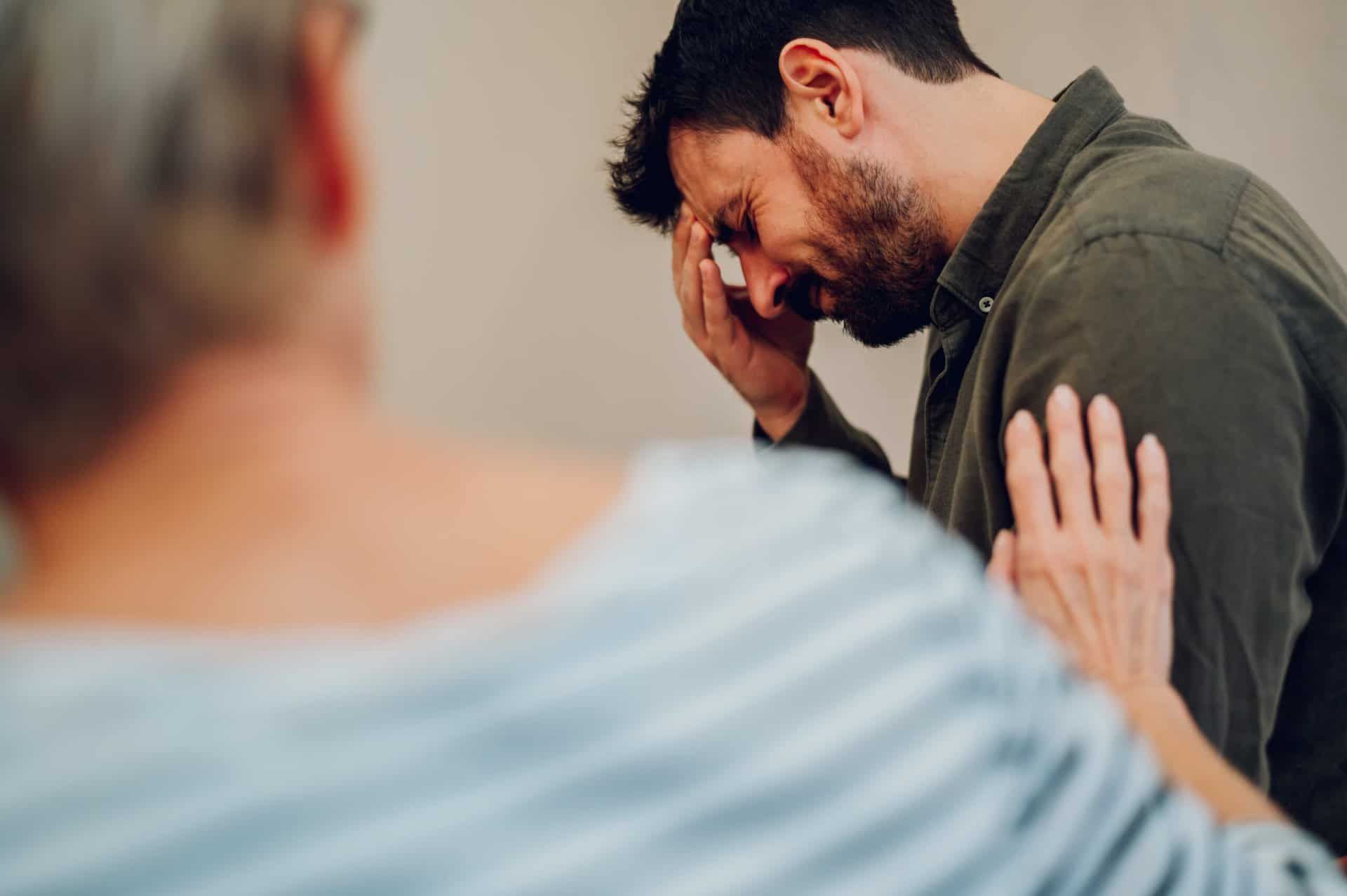Dual Diagnosis Addiction and Mental Health Treatment Centers Covered by UHC Insurance in Tennessee
Many may wonder, “Does UHC cover dual-diagnosis rehab?” The answer is yes. United Healthcare Insurance typically covers dual diagnosis addiction and mental health treatment in Tennessee. At Freeman Recovery Center, we operate multiple rehab facilities across Tennessee, all of which specialize in dual diagnosis addiction and mental health treatment.
This holistic approach allows us to treat all of the complexities for patients who struggle with dual substance use disorders and mental health issues. Our treatment programs are created to provide integrated care that simultaneously tackles all aspects of a patient’s health, ensuring a more effective and holistic recovery process.
At Freeman Addiction Recovery Center, we are committed to making dual-diagnosis treatment and integrated behavioral health accessible and affordable. That’s why we accept various insurance plans, including United Healthcare Insurance (UHC), to help cover treatment costs. We aim to remove financial barriers to treatment and provide high-quality rehab care to those in need. You can contact us at (615) 645-3677 to learn more about our dual-diagnosis treatment options and how we can support you or your loved one on the journey to recovery.
Getting to Know Middle Tennessee and its Best Attractions and Destinations
Middle Tennessee is a vibrant region rich in history, culture, and natural beauty, offering many attractions for visitors and residents alike. Nashville, often called the heart of Middle Tennessee, is home to iconic music landmarks such as the Grand Ole Opry, Ryman Auditorium, and the Country Music Hall of Fame and Museum.
Bridgestone Arena hosts various events for sports and entertainment enthusiasts, from concerts to hockey games. Families can enjoy a day at the Nashville Zoo at Grassmere, while history buffs might explore Andrew Jackson’s Hermitage or the Belle Meade Historic Site. Nature lovers can marvel at the unique architecture of The Parthenon in Centennial Park or venture into the depths of Cumberland Caverns.
Beyond Nashville, Middle Tennessee boasts a range of diverse attractions. The mysterious Bell Witch Cave in Adams offers a glimpse into local folklore. At the same time, Cheekwood Botanical Garden and Museum of Art provides a peaceful retreat with its beautiful gardens and art exhibits. Oaklands Mansion in Murfreesboro showcases antebellum architecture and history. Outdoor enthusiasts will appreciate the scenic beauty of Old Stone Fort State Archaeological Park, Montgomery Bell State Park, and Percy Warner Park. The Frist Art Museum and the Tennessee State Museum in Nashville offer enriching experiences for those interested in art and history. Additionally, the expansive Gaylord Opryland Resort & Convention Center and the picturesque Bicentennial Capitol Mall State Park provide experiences for visitors of all ages.
What Is Treated at a Dual Diagnosis Rehab Center in Tennessee?
Dual diagnosis rehab centers in Tennessee provide comprehensive treatment for individuals grappling with both substance use disorders and co-occurring mental health issues. These facilities employ a multidisciplinary approach, combining medical detoxification, evidence-based therapies, psychiatric care, and counseling services to address the complex connection between addiction and mental health.
Through personalized treatment plans, patients receive specialized care designed to target their unique challenges and underlying issues, fostering a holistic path to recovery. By simultaneously addressing addiction and mental health concerns, these centers strive to equip individuals with the tools and support necessary to achieve sustained sobriety and improve their overall well-being.
Therapy and Treatment for Substance Use Disorders (SUDs): Alcohol and Drug Addiction
Therapy and treatment for substance use disorders (SUDs), including alcohol and drugs, involve a multifaceted approach. For alcohol use disorder, interventions like Cognitive Behavioral Therapy (CBT), dual diagnosis counseling, motivational interviewing, and medications such as naltrexone or acamprosate are commonly used to address cravings and withdrawal symptoms, alongside support groups like Alcoholics Anonymous (AA), fostering lasting recovery.
In the case of opioid use disorder, co-occurring treatment programs utilize evidence-based treatments like Medication-Assisted Treatment (MAT) combining medications such as methadone, buprenorphine, or naltrexone with counseling and behavioral therapies have shown effectiveness in reducing opioid cravings and preventing relapse. Therapy may also include addressing underlying psychological issues contributing to addiction.
For cocaine use disorder, therapy focuses on cognitive-behavioral strategies to identify triggers, develop coping skills, and prevent relapse. Contingency management, which rewards abstinence with incentives, is another effective approach. Additionally, support groups like Cocaine Anonymous (CA) provide peer support and encouragement.
Treatment for methamphetamine use disorder typically involves behavioral therapies like CBT or Motivational Enhancement Therapy (MET) to address cravings, manage triggers, and develop healthier coping mechanisms. Integrated treatment addressing co-occurring mental health issues is also crucial for long-term recovery.
In the case of cannabis use disorder, therapy may include cognitive-behavioral interventions to challenge maladaptive thought patterns and behaviors associated with marijuana use. MET can help individuals resolve ambivalence about quitting and increase their motivation for change.
Prescription drug abuse, whether opioids, benzodiazepines, or stimulants, requires a multifaceted approach combining medication management, therapy, and support. MAT may be utilized for opioid addiction, while therapy focuses on treating the underlying reasons for substance misuse and developing skills to prevent relapse. Additionally, education on safe medication use and alternatives for managing pain or anxiety is crucial in preventing future misuse. To learn more about the dual diagnosis support programs we offer at Freeman Recovery, contact us at (615) 645-3677.
Therapy and Treatment for Mental Health Disorders
Therapy and treatment for mental health disorders are individualized to meet diverse needs. Depression may be addressed through Cognitive Behavioral Therapy (CBT), mental health rehabilitation programs, interpersonal therapy, and mindfulness-based interventions, complemented by antidepressant medications like SSRIs or SNRIs to manage symptoms.
Anxiety disorders, including generalized anxiety disorder and panic disorder, are often treated with a combination of therapy and medications. Dual diagnosis interventions, cognitive-behavioral therapies, exposure therapy, and relaxation techniques can help individuals manage anxiety symptoms, while medicine like Selective Serotonin Reuptake Inhibitors (SSRIs), benzodiazepines, or beta-blockers may be used to alleviate symptoms during acute episodes or on a long-term basis.
Bipolar disorder requires a specialized treatment regimen that combines mood-stabilizing medications like lithium or anticonvulsants with psychotherapy. Cognitive-Behavioral Therapy (CBT) and psychoeducation can help individuals with bipolar disorder better understand their condition, manage mood swings, and develop strategies for preventing relapse.
For schizophrenia, treatment typically involves antipsychotic medications to manage symptoms such as hallucinations, delusions, and disorganized thinking. In addition to medication management, supportive therapies like CBT, individual counseling, group therapy, and social skills training help patients with schizophrenia improve functioning and quality of life.
Post-Traumatic Stress Disorder (PTSD) is treated with a combination of therapy and medications. Therapeutic approaches such as Cognitive Processing Therapy (CPT), prolonged exposure therapy, and Eye Movement Desensitization and Reprocessing (EMDR) can help process traumatic experiences and alleviate symptoms. Medications like SSRIs or SNRIs may also be prescribed to manage co-occurring conditions like anxiety and depression.
Obsessive Compulsive Disorder (OCD) is treated with therapy, medications, and sometimes lifestyle changes. CBT techniques like Exposure and Response Prevention (ERP) can help individuals gradually confront and manage obsessive thoughts and compulsive behaviors.
Borderline Personality Disorder (BPD) often requires long-term therapy focused on building coping skills, improving emotion regulation, and fostering healthier interpersonal relationships. Dialectical Behavior Therapy (DBT), schema-focused therapy, and mentalization-based therapy are commonly used approaches for treating BPD, along with medications to manage symptoms such as mood instability, impulsivity, and anxiety.
Therapy and Treatment for Co-occurring Disorders
Therapy and treatment for co-occurring disorders (dual diagnosis) address mental health conditions and substance use disorders simultaneously. This integrated approach is essential, as one condition can worsen the other. Effective treatment combines psychotherapy, medication management, and holistic therapies tailored to the individual. Treating both disorders together gives individuals a better chance of achieving long-term recovery and improving their overall well-being.
Treating co-occurring disorders like depression and alcoholism, for example, demands a holistic approach. Merging Cognitive Behavioral Therapy (CBT) with alcoholism-focused interventions and medications targeting depression symptoms can complement psychotherapy, while participation in support groups like Alcoholics Anonymous (AA) provides essential peer support for achieving lasting recovery.
Patients facing anxiety disorders alongside opioid dependence benefit from a dual-focus approach, integrating cognitive-behavioral techniques to manage anxiety symptoms with Medication-Assisted Therapy (MAT) targeting opioid addiction. This integrated care model ensures individuals receive holistic support, addressing both mental health concerns and substance use issues concurrently.
The intersection of bipolar disorder and cocaine addiction presents unique therapeutic challenges necessitating specialized treatment interventions. Methods like Dialectical Behavior Therapy (DBT) or Cognitive-Behavioral Therapy (CBT) are employed to help individuals regulate mood swings while concurrently addressing cravings and triggers associated with cocaine addiction. Pharmacological interventions to stabilize mood may complement therapeutic approaches, aiding in sobriety and long-term recovery.
Trauma-informed care proves vital for individuals contending with PTSD and substance abuse. Therapy like Cognitive Processing Therapy (CPT) or Eye Movement Desensitization and Reprocessing (EMDR) are utilized to address trauma while simultaneously addressing substance abuse through counseling, support groups, and MAT when deemed appropriate. This integrated approach promotes healing and recovery on multiple fronts, fostering resilience and empowerment.
For individuals managing schizophrenia alongside coexisting substance use disorders, an integrated treatment approach is paramount. Antipsychotic medications are often utilized to manage symptoms of schizophrenia, while therapeutic interventions such as CBT or supportive talk therapy address substance use issues and aid in developing coping strategies. Services, including case management and support groups, are important in promoting recovery and enhancing overall functioning and well-being in individuals with co-occurring schizophrenia and substance use disorders. Contact us at Freeman Recovery Center to learn more about our comprehensive treatment for co-occurring disorders.

Book a Free Assessment
Contact us to schedule a free addiction or mental health assessment as part of our admissions process.
Check Your Insurance Coverage
What Is United Health Care Insurance Coverage for Dual Diagnosis Treatment in Tennessee?
UnitedHealthcare Insurance coverage for dual diagnosis treatment in Tennessee varies depending on the specific plan and individual policy. Generally, UnitedHealthcare provides coverage for dual diagnosis treatment, including services for both substance use and mental health disorders. This coverage typically includes inpatient and outpatient treatment programs, therapy sessions, medication management, and other necessary services for comprehensive care.
UnitedHealthcare’s coverage for dual diagnosis treatment may include detoxification programs, residential treatment centers, Partial Hospitalization Programs (PHP), Intensive Outpatient Programs (IOP), and outpatient therapy sessions. Additionally, UnitedHealthcare often covers Medication-Assisted Treatment (MAT) for substance use disorders, as well as psychiatric services for managing co-occurring mental health conditions.
It’s essential for individuals with UnitedHealthcare insurance to review their specific plan details and coverage benefits to understand what treatment is included and if there are any potential out-of-pocket costs. Additionally, verifying coverage with the treatment provider and obtaining pre-authorization, if required, can help ensure smooth access to dual diagnosis treatment services in Tennessee. Contact us at Freeman Alcohol and Drug Addiction Center to take advantage of our integrated care approach and holistic mental health treatment programs. To better understand your coverage for coexisting disorders treatment under your United Healthcare plan, you can verify your insurance for treatment through us at Freeman Recovery.
Does UHC Insurance Cover Co-Occurring Disorder Programs for Addiction and Mental Health Therapy in Tennessee?
Yes, UnitedHealthcare (UHC) typically covers the cost of co-occurring disorder programs for addiction and mental health therapy in Tennessee. These programs often include comprehensive treatment for individuals facing substance abuse and mental health issues. UHC coverage may encompass various levels of care, including inpatient, outpatient, therapy sessions, medication management, and other necessary services to address both conditions simultaneously.
UnitedHealthcare’s coverage for co-occurring disorder programs commonly includes access to detoxification , residential treatment centers, PHP, IOP, and outpatient therapy sessions. Additionally, UHC insurance often covers evidence-based treatments such as Cognitive Behavioral Therapy (CBT), Medication-Assisted treatment (MAT), and psychiatric services tailored to address co-occurring addiction and mental health concerns.
As coverage can vary based on the specific plan and individual policy, it’s crucial for individuals with UnitedHealthcare insurance to review their plan details and benefits thoroughly. Understanding coverage details, potential out-of-pocket costs, and any requirements for pre-authorization can help you access the appropriate co-occurring disorder programs and mental health therapy services effectively in Tennessee. Consulting with the insurance provider and reaching out to us at Freeman Recovery Center to verify insurance levels for treatment can ensure more clarity regarding your treatment coverage and facilitate a smoother treatment process. To discuss your UHC coverage with us at Freeman Recovery Center for addiction and mental health therapy, call our team at (615) 645-3677.
Nashville Tennessee Stats on Dual-Diagnosis Treatment and Insurance Claims
In 2022, data from the Tennessee Department of Mental Health and Substance Abuse Services revealed that 10,080 patients were treated for opioid addiction, 6,966 for alcohol addiction, and 7,328 for marijuana addiction. Additionally, the Tennessee Department of Health reported significant gender disparities in overdose deaths, with men accounting for 2,612 fatalities and women for 1,214.
The Tennessee Department of Health also highlighted racial disparities in overdose deaths for the same year. Caucasians had the highest number of overdose deaths at 2,866, followed by African Americans with 817 deaths. Individuals of all other races combined accounted for 132 fatalities.
Understanding the UnitedHealthcare Community Plan in Middle Tennessee
The UnitedHealthcare Community Plan in Middle Tennessee delivers tailored Medicaid coverage, encompassing essential benefits like doctor visits, hospital stays, prescriptions, preventive care, and behavioral health services. With access to a network of providers, members receive quality care conveniently located within their community.
In addition to medical services, UnitedHealthcare Community Plan in Middle Tennessee may offer additional benefits and resources to support members’ overall health and well-being. These benefits may include transportation assistance, dental and vision care, maternity services, wellness programs, and community support services. By understanding and enrolling in UnitedHealthcare Community Plan in Middle Tennessee, individuals and families can access the necessary healthcare services and support to maintain and improve their health.

Dual Diagnosis Centers in the State of Tennessee That Take United Healthcare Insurance
Dual diagnosis centers in Tennessee that accept United Healthcare insurance usually offer integrated treatment for patients who have substance addiction and mental health issues at the same time. These facilities understand the importance of accessible care and accept insurance to help patients receive the support they need to achieve sobriety.
Freeman Recovery Center, located at 1615 HWY 96, Burns, TN 37029, is a dual-diagnosis center that takes most United Healthcare plans. At Freeman Recovery, we provide detox and residential inpatient services for individuals requiring intensive rehab treatment. We also offer access to Partial Hospitalization (PHP), Intensive Outpatient (IOP), and Outpatient (OP) services at our facility located at 222 State St, Dickson, TN 37055. Freeman Recovery Centers prioritize holistic care and accept United Healthcare insurance to ensure individuals have access to the necessary treatment and support.
Detox / Residential Center:
1615 HWY 96, Burns, TN 37029
Hours of Operation: 24/7
PHP / IOP / OP Center:
222 State St, Dickson, TN 37055
Hours of Operation:
Monday – Friday, 8am – 9pm
Admissions / Admin Office:
250 State St, Dickson, TN 37055
Hours of Operation:
Monday – Friday, 8am – 5pm
Check Your UHC Insurance for Dual Diagnosis Treatment
Discovering UHC Commercial Insurance Plans: What You Need to Know
Discovering UnitedHealthcare (UHC) commercial insurance plans entails grasping the array of coverage options for individuals and businesses, including employer-sponsored, individual/family, and Medicare Advantage plans. These plans grant access to extensive healthcare provider networks, comprehensive medical services, and wellness initiatives, all aimed at enhancing overall health and wellness.
When exploring UHC commercial insurance plans, it’s essential to consider coverage levels, premiums, deductibles, and co-pays. Additionally, you should understand the network of healthcare providers and facilities included in your plan, as well as any limitations or exclusions, so you can make informed decisions about treatment. UHC also offers tools and resources to help individuals and businesses navigate insurance options, compare plans, and find the coverage plan that fits their needs. Contact us at Freeman Recover Center to learn about our dual diagnosis programs and whether your commercial UHC plan covers treatment at our facility.
Learning About UHCs Insurance Brands, Products, and Service Offerings
In Tennessee, UnitedHealthcare (UHC) provides a wide array of insurance brands, products, and services designed to meet the healthcare needs of patients, communities, and their families. From comprehensive health insurance plans to specialized offerings like dental and vision insurance, UHC offers tailored solutions to support the health and well-being of Tennessee residents.
- UnitedHealthcare Plans: UHC provides a variety of health insurance policies, including individual and family plans, Medicare Advantage plans, and employer-sponsored plans.
- UnitedHealthcare Community Plan: This Medicaid plan serves eligible individuals and families in Tennessee, providing access to essential healthcare services and support programs to promote overall well-being.
- UnitedHealthcare Medicare Plans: UHC offers Medicare Advantage plans, Medicare Supplement Insurance (Medigap) plans, and Medicare prescription drug (Part D) plans, providing comprehensive coverage options for Medicare beneficiaries in Tennessee.
- UnitedHealthcare Pharmacy Services: UHC’s pharmacy services include prescription drug coverage, medication management programs, and access to a network of pharmacies, ensuring convenient and affordable access to medications for individuals in Tennessee.
- UnitedHealthcare Wellness Programs: UHC offers wellness programs and resources to promote healthy lifestyles and preventive care, empowering individuals in Tennessee to take control of their health and well-being.
UHCs Connect Health Plan, What is It?
UHC’s Connect Health Plan is a comprehensive healthcare solution designed to offer individuals and families in Tennessee access to quality medical care and services. This plan typically includes a range of benefits such as coverage for preventive care, doctor visits, specialist consultations, prescription medications, and hospital stays.
Connect Health Plan members often have access to a network of healthcare providers, physicians, clinics, and hospitals, ensuring convenient access to medical services across Tennessee. Additionally, the plan may offer wellness programs, telehealth services, and other resources to support members in managing their health. To check your UHC insurance coverage for treatment at Freeman Recovery Center or to learn more about the admissions process to begin your treatment, call us at (615) 645-3677.
What is UHC Dual-Diagnosis Coverage for Addiction Treatment & Mental Health Coverage in Tennessee?
UnitedHealthcare (UHC) provides extensive coverage for dual-diagnosis treatment in Tennessee, encompassing services like medical detox, therapy, medication management, and support programs targeting addiction and mental health issues concurrently. With tailored care plans, UHC ensures individuals receive comprehensive, integrated treatment, fostering effective and enduring recovery results.
Members of UnitedHealthcare in Tennessee can access a network of treatment providers and facilities specializing in dual-diagnosis treatment. Additionally, UHC may offer additional resources such as case management, support groups, and access to specialized programs to support people throughout their recovery journey. By offering comprehensive coverage for dual-diagnosis treatment, UnitedHealthcare aims to provide individuals in Tennessee with the necessary support and resources to achieve optimal mental health and wellness.
Do you or a loved one struggle with addiction? We can help. Contact us at Freeman Recovery Center to inquire about our treatment options and to see if your UHC plan covers treatment at our facility.

Does UHC Health Insurance Cover Dual Diagnosis Rehab in the State of Tennessee?
UnitedHealthcare (UHC) health insurance generally covers dual diagnosis rehab in Tennessee, yet coverage varies by plan. Services like medical detox, therapy, medication management, and support programs are often part of coverage, but you should check your policy details for costs and specifics to make informed decisions.
Review your plan documents or contact your provider directly to understand your coverage for dual diagnosis rehab. Alternatively, you can call (615) 645-3677 to verify your insurance and see if your UHC plan covers dual-diagnosis services at Freeman Recovery Center. It’s essential to be aware of any co-pays, deductibles, or limitations on services to make informed decisions about accessing treatment. Additionally, obtaining pre-authorization, if required by the insurance plan, can help ensure smooth access to dual diagnosis rehab services and minimize out-of-pocket costs.
How Much Does Dual Diagnosis Treatment Cost With UHC Insurance in the State of Tennessee?
The cost of dual diagnosis treatment with UnitedHealthcare (UHC) insurance in Tennessee varies depending on the specific plan, coverage details, and individual policy terms. While some of the costs may be covered by UHC insurance, including services like medical detoxification, therapy, counseling, medication management, and support programs, the extent of coverage and out-of-pocket expenses can differ significantly between plans.
Individuals seeking dual diagnosis treatment in Tennessee with UHC insurance should review their policy details carefully to understand coverage specifics, including any co-pays, deductibles, or limitations on services. Additionally, contacting the insurance provider directly or contacting us at Freeman Recovery can help you better understand the cost of dual diagnosis treatment and any potential financial obligations you may incur.
How to Check My UHC Coverage for CO-Occurring Disorder Rehab in Tennessee
To verify your UnitedHealthcare (UHC) coverage for co-occurring disorder rehab in Tennessee, contact the customer service number on your insurance card. Representatives can offer details on coverage and associated costs. Alternatively, you can log in to your account on the UHC website for specific plan and coverage information.
If you prefer assistance in verifying your UHC insurance coverage for co-occurring disorder rehab in Tennessee, you can contact us at Freeman Recovery Center. Simply call for help navigating the insurance and rehab admissions process.
What Types of Dual Diagnosis Treatment Does UHC Cover in Tennessee?
UnitedHealthcare (UHC) in Tennessee typically covers a range of dual diagnosis treatment services, including medical detoxification, residential inpatient treatment, PHP, IOP, outpatient therapy, medication management, and support programs. These services are designed to address substance abuse and mental health issues concurrently, aiming to provide individuals with personalized care for effective and enduring recovery.
Below are examples of the types of dual diagnoses that UnitedHealthcare may cover in Tennessee. This is not an exhaustive list but rather highlights common co-occurring conditions and treatment modalities available to those seeking dual-diagnosis care.
Co-Occurring AUD Treatment Near Nashville
Near Nashville, co-occurring Alcohol Use Disorder (AUD) treatment offers integrated therapy and support to address alcohol addiction alongside underlying mental health issues like depression or anxiety. By addressing both conditions simultaneously, these programs aim to foster lasting recovery and enhance overall mental well-being.
UnitedHealthcare (UHC) typically covers co-occurring AUD treatment near Nashville as part of its comprehensive health insurance plans. Services such as medical detoxification, inpatient or outpatient rehab programs, therapy sessions, medication management, and support groups may be included in the coverage. UHC’s commitment to providing access to quality healthcare means individuals seeking co-occurring AUD treatment can often utilize their insurance benefits to access the necessary care and support in the Nashville area. If you or a loved one struggles with alcoholism, contact us at Freeman Substance Abuse Recovery Center to start your journey to sobriety with us today.
Co-Occurring SUD Treatment Near Nashville
Co-occurring Substance Use Disorder (SUD) treatment near Nashville offers integrated therapy and support to treat substance abuse and underlying mental health conditions concurrently. Through a range of therapeutic approaches and counseling services, these programs aim to foster sustained recovery and enhanced overall well-being by addressing substance use issues alongside related mental health concerns.
UnitedHealthcare (UHC) typically covers co-occurring SUD treatment near Nashville as part of its health insurance plans. These services may include medical detoxification, inpatient or outpatient rehab programs, therapy sessions, medication management, and support groups. By offering coverage for co-occurring SUD treatment, UHC enables individuals to access the necessary care and support to address their substance use issues and underlying mental health conditions effectively in the Nashville area.
Co-Occurring Mental Health Near Nashville
Co-occurring mental health treatment in and around Nashville, Tennessee, often integrates therapy, counseling, and support services to treat patients for both mental health and substance use concurrently. By targeting conditions like depression, anxiety, PTSD, and schizophrenia alongside substance abuse concerns, these programs aim to foster improved overall well-being and long-term recovery outcomes.
UnitedHealthcare (UHC) typically covers co-occurring mental health treatment near Nashville as part of its health insurance plans. Services offered may include therapy sessions, medication management, counseling for both mental health and addiction, and support groups. By covering co-occurring mental health treatment, UHC enables individuals to access the necessary care and support to address both aspects of their condition effectively and improve their mental health in the Nashville area. Contact us at Freeman Recovery Center to inquire about the co-occuring disorders treatment options we offer.
Co-Occurring Treatment Near Nashville
Near Nashville, co-occurring treatment often offers integrated care for those who deal with substance abuse and mental health issues together. Through a combination of therapeutic modalities and counseling, these programs aim to address the complex relationship between substance use and mental health issues, fostering holistic healing and long-term recovery outcomes.
UnitedHealthcare (UHC) typically covers co-occurring treatment near Nashville as part of its health insurance plans. Coverage may include therapy sessions, medication management, counseling for addiction and mental health disorders, and participation in support groups. By offering comprehensive coverage for co-occurring treatment, UHC supports individuals in accessing the necessary care and resources to address both aspects of their condition effectively and achieve improved overall well-being in the Nashville area.

How to Get UHC Insurance To Pay For Dual-Diagnosis Addiction Rehab and Mental Health Treatment in the State of Tennessee
To ensure UnitedHealthcare (UHC) insurance pays for dual-diagnosis addiction rehab and mental health treatment in the state of Tennessee, you can follow several steps. First, you can confirm your UHC coverage for addiction rehab by contacting UHC directly, by reviewing your policy documents, or contacting us at Freeman Recovery Center.
It’s important for you to understand what services are covered, such as medical detox, therapy, counseling, medication management, and support programs, and any associated costs like co-pays or deductibles. Next, you should seek treatment from a facility that accepts UHC insurance and specializes in dual-diagnosis treatment. You can provide your insurance information to us at Freeman Recovery Center so we can handle the insurance verification process, including obtaining pre-authorization for treatment if necessary. Be proactive in communicating with UHC and the admissions team at your chosen facility to help ensure a smooth admissions process and to address any questions or concerns about coverage and payment for treatment.
How Many Times Will UHC Health Insurance Pay For Dual-Diagnosis Treatment Near Me?
The number of times UnitedHealthcare (UHC) health insurance will pay for dual-diagnosis treatment near you depends on your specific plan, coverage details, and individual treatment needs. In many cases, UHC insurance provides coverage for multiple rounds of dual-diagnosis treatment, particularly if additional treatment is seen as medically necessary by a healthcare professional.
However, the exact number of times UHC will pay for dual-diagnosis treatment can vary. It is essential to review your insurance policy carefully or contact UHC directly to understand your coverage limits, including any restrictions on the number of treatment sessions or episodes of care covered under your plan. Additionally, discussing your treatment options and coverage details with a healthcare provider or treatment facility can help you make informed decisions about accessing dual-diagnosis treatment near you. Contact Freeman Recover Center at (615) 645-3677 to inquire about our treatment programs and see if your UHC plan will cover multiple rounds of treatment.
Dual Diagnosis Therapy / Treatment Information and Statistics in Tennessee
- In Tennessee, the intersection of substance abuse disorders and mental health conditions presents a complex challenge. In 2022, data from the Tennessee Department of Mental Health and Substance Abuse Services indicated that 10,080 patients received treatment for opioid addiction, 6,966 for alcohol addiction, and 7,328 for marijuana addiction in the state.
- According to additional data from 2022, overdose deaths in the state displayed a significant gender disparity. Men accounted for the majority of fatalities, with 2,612 deaths due to overdoses, while women represented a considerably lower number, with only 1,214 overdose deaths reported during the same period. That data also showed that Caucasians had the highest number of overdose deaths, totaling 2,866. This was followed by African Americans, with 817 deaths, while individuals of all other races combined accounted for 132 fatalities.
- According to data from the National Center for Drug Abuse Statistics (NCDAS), there are an average of 2,089 overdose deaths each year. In the past three years, Tennessee has seen a concerning rise in overdose deaths, with an annual increase of 8.49%. This growth rate is 50.72% higher than the national average. Furthermore, Tennessee accounts for 2.97% of all overdose deaths in the country, highlighting the severe impact of substance misuse in the state.
- In Tennessee, the convergence of substance abuse disorders and mental health issues poses a multifaceted challenge. The data from 2022 provided by the Tennessee Department of Mental Health and Substance Abuse Services underscored the significant need for intervention, with thousands seeking treatment for various addictions. The concerning gender and racial disparities in overdose deaths further emphasize the urgency of addressing these issues comprehensively. With an alarming rise in overdose deaths in recent years, Tennessee’s struggle with substance misuse surpasses national averages, highlighting the critical importance of continued efforts to combat addiction and promote mental health wellness throughout the state.
Connect With Us For An Assessment Today




